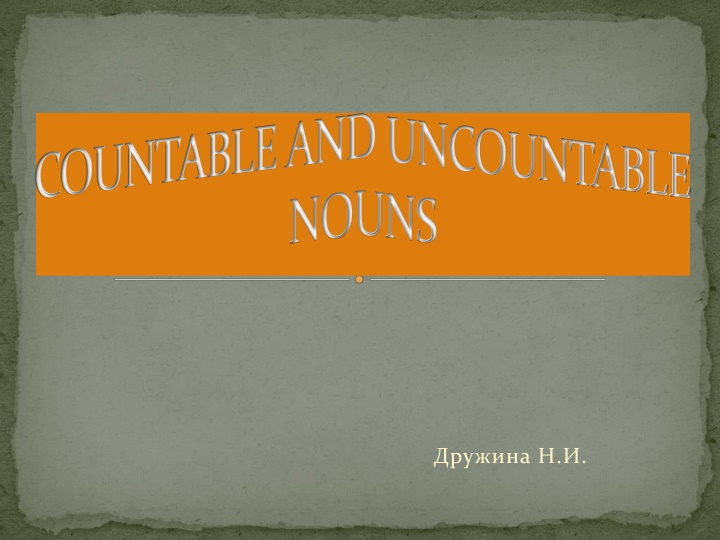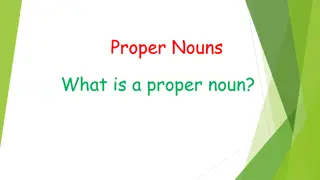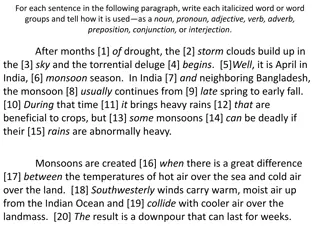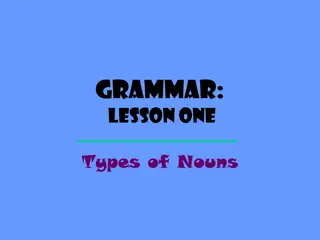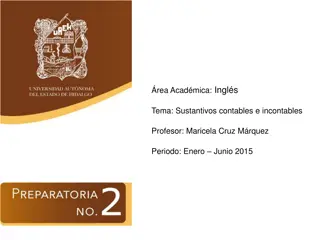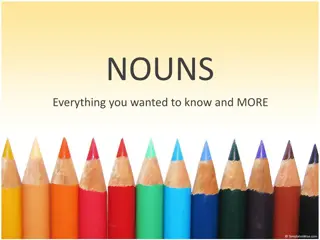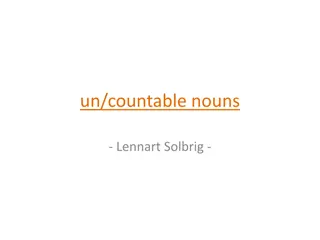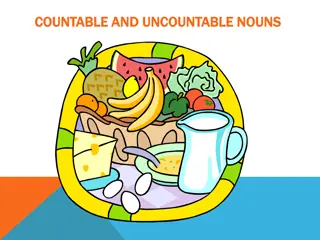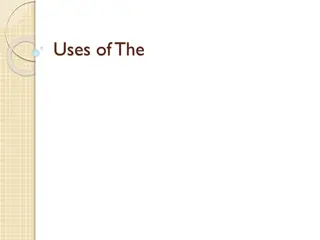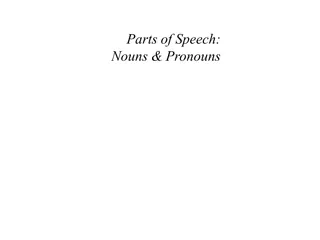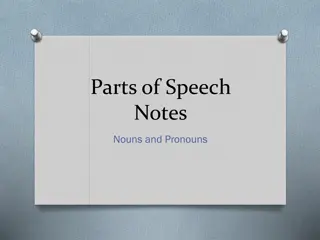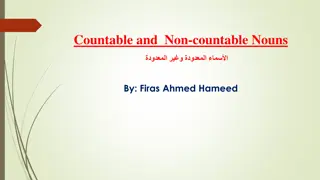Countable and Uncountable Nouns
The differences between countable and uncountable nouns, with examples highlighting how the same word can have varied meanings based on its usage. Learn about common nouns used in both ways, along with food items that change meaning as countable or uncountable. Discover where you would expect to find certain items in homes based on their meanings.
Download Presentation

Please find below an Image/Link to download the presentation.
The content on the website is provided AS IS for your information and personal use only. It may not be sold, licensed, or shared on other websites without obtaining consent from the author.If you encounter any issues during the download, it is possible that the publisher has removed the file from their server.
You are allowed to download the files provided on this website for personal or commercial use, subject to the condition that they are used lawfully. All files are the property of their respective owners.
The content on the website is provided AS IS for your information and personal use only. It may not be sold, licensed, or shared on other websites without obtaining consent from the author.
E N D
Presentation Transcript
COUNTABLE AND UNCOUNTABLE NOUNS . .
: ; ; .
Countable and uncountable nouns with different meaning When we use a countable noun, we are thinking of specific things that can be counted, e.g., two glasses. When we use it as an uncountable noun, we are thinking of stuff or material or idea of a thinking in general, e.g., Glass is breakable .
Stuff/Material (generalized) Things (specific) glass a glass/glasses cloth a cloth fish a fish thread a thread Be careful! There s broken glass on the road. I need a cloth to wipe the table. We had fish for dinner. I need some black thread to hem this skirt.
Here are some more nouns used in both ways. Make sure you know the difference between the uncountable and the countable meaning hair-a hair paper-a paper land a land people-a people (a people-such as a race of people) home-a home work- a work Waiter! There s a hair in my soup! Did you buy a paper this morning? (a newspaper) I love meeting people from different land. (individuals/countries) Her grandmother lives in a home. (an institution) Hamlet is one of Shakespeare s most famous works.
The names of food items often have a different meaning depending on whether they are used as countable or uncountable nouns Coffee/tea a coffee and two teas Chicken (many meat) a chicken (one) Would you like some chocolate? Would you like a chocolate? (a bar of chocolate) (a box of sweets) Salt and pepper a pepper (dish) (a vegetable)
Would you expect to find these things in or near most peoples homes? In which room or place? Answer for both meanings (countable and uncountable) Example: iron Most people have an iron to iron their clothes, usually in the kitchen or laundry room. People don t normally keep iron (the metal) at home, but they may have things made of iron, such as a frying pan in the kitchen. 1. Cloth 2. pepper 3.tape 4. fish 5. glass
Possible answers: Most people have a cloth somewhere in the kitchen to wipe the work surfaces and in case they spill something. People who like to make clothes might have cloth at home, usually in a room where a sewing machine is kept. 1. For those who like to use peppers in cooking (e.g., bell peppers, jalapeno peppers), they would be found in the kitchen. Most people have pepper (together with salt) in their kitchen or dining room. 2. You would have a tape if you have a tape recorder or a VCR , and you d probably keep it near the machine. Most people keep Scotch tape in or near a desk, and some people keep a measuring tape in a sewing room or possibly in a desk. 3. Some people have a fish (or several fish) swimming around in a tank or fishbowl in their living room. Of course, for cooking, fish would usually be found in the kitchen. 4. Most people keep glasses (for drinking) in the kitchen, dining room, or other rooms. Most homes also have glass somewhere, usually in the windows. 5.
Answer these remarks using the word in parentheses. Use a/an if the meaning is countable. Example: Oh no! I spilled milk on the floor! (cloth) Don t worry. Here s a cloth; just wipe it up. 1. How did you get that puncture in your tire? (glass) I drove over some glass. or There was glass on the road. 2. This soup tastes a little bland. What can we sprinkle on it? (pepper) How about some pepper? 3. Mommy, what s the Mona Lisa? (work) It s a very famous work of art, a painting. 4. There s something hanging from the bottom of your coat. (thread) Oh, it s a thread. I ll just cut it off.
Painting a noise/noises light Painting (uncountable) can be an occupation or a hobby. A painting or paintings are individual works of art, each created by someone. 1. 2. A noise/Noises would mean one or more particular sounds. So much noise (uncountable) can mean many sounds (usually unpleasant) that might go on over a period of time. 3. Light (uncountable) usually means light to see by, e.g., electric light. In its countable form, as in the request Can I have a light? , it usually refers to a match or pipe.
Explain the difference between (a) and (b) in each pair. 1.(a) I enjoy painting as a hobby. (general painting) (b) Are these paintings by Picasso? (specific paintings) 2. (a) Did you hear a noise coming from the basement? (a particular noise) (b) Will you kids stop making so much noise? (general noise) 3. (a) Can I have some light? (general light) (b) Can I have a light? (a match)
